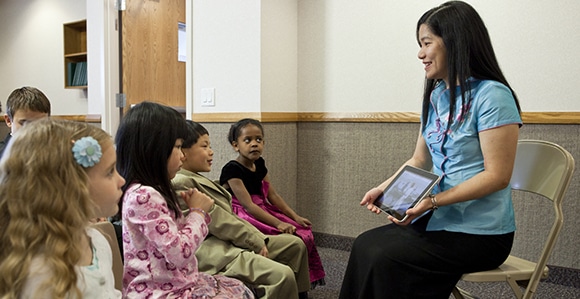 A few months ago, my friend asked me to sub her Gospel Doctrine class. I did, and the lesson went really well. After class, the Sunday School president cornered me and said he hadn’t been there, but four people had already told him what a great job I’d done, and would I consider making this a full-time gig? To my surprise, I found I really wanted to teach. I’d been thinking about taking a step back from church, but I thought maybe this was God’s way of telling me I should stick around. I said yes, that teaching once a month would be perfect for me. He said he’d submit my name.
A few months ago, my friend asked me to sub her Gospel Doctrine class. I did, and the lesson went really well. After class, the Sunday School president cornered me and said he hadn’t been there, but four people had already told him what a great job I’d done, and would I consider making this a full-time gig? To my surprise, I found I really wanted to teach. I’d been thinking about taking a step back from church, but I thought maybe this was God’s way of telling me I should stick around. I said yes, that teaching once a month would be perfect for me. He said he’d submit my name.
I found out later I was on a list of five names submitted for four open spots. I had a meeting a month or so later with the bishopric first counselor, and I told him I was burned out in my calling. I told him how much I’d enjoyed teaching Gospel Doctrine. “We’re going to keep you where you are for now,” he said.
I sent him an email later telling him I had received a strong impression that God wanted me to teach Sunday School. I reiterated that I was burned out in my calling and would like to be released. He never responded. The four other people were called.
I thought about confronting my bishop to ask if he had reservations about me teaching, but based on previous experiences with him, I felt 90% sure he would gaslight me and say it was God who didn’t want me teaching Sunday School and of course he didn’t have anything against me.
– ElleK
Over the last two years, I’ve been through a crisis of faith. In the end, I’ve freed myself from the oversight of ecclesiastical authority by reclaiming my personal authority to make spiritual decisions for myself and my family. The problem is, the leaders of my ward do not accept or acknowledge my declaration of independence, and instead, still maintain the power to shout down my voice.
I have served as the Primary chorister for three primary programs, and every fall I prayerfully consider if I should resign from my calling after the children perform.
This year was no different, and even though I’ve been feeling a desire for a church sabbatical, I prayed and decided to stay and serve the children of our ward. So I was surprised that a meeting with a counselor in the bishopric for a new calling ended with the offer of release from Primary.
I asked them to reconsider. I conveyed my desire to continue to serve in Primary — they told me they don’t like to let women languish there for years.
I told them I wanted to stay in Primary — they said they knew better than me.
I said I couldn’t fulfill the new calling because of time constraints due to my intense work schedule — they told me they think I’d be perfect for the new assignment and that I’d like it (for the record, I’ve done this one before, and I despise it).
In a moment of desperation to keep my calling, I told them that without my current calling, I’d no longer feel a pull to come to church — and after considering my statement for a week, they released me anyway.
Despite the fact that they had neither heard nor validated my concerns, inspiration or preferences, despite the fact that they released me over my objections, they did offer an olive branch — they could bring in a member of the stake presidency to mediate the situation.
Of course, I refused this offer. I’m not even sure what they were going to “mediate.” Perhaps they thought someone with more power and authority could get me to listen.
But my dear brothers in the gospel, the problem isn’t me listening to you. It’s that YOU are not listening to me. And though you can strip me of my calling at your whim, and though I have no true voice in the matter, no amount of ecclesiastical counseling or authority will convince me to suppress my newly claimed independence.
– Natalie G.
Pro Tip: Listen to women when they tell you the inspiration they’ve received about their callings. Whenever possible, facilitate what they feel God wants them to do.
Click here to read all of the stories in our #hearLDSwomen series. Has anything like this happened to you? Please share in the comments or submit your experience(s) to participate in the series.
“If any man have ears to hear, let him hear.” (Mark 4:23)






5 Responses
“Listen to women when they tell you the inspiration they’ve received about their callings. Whenever possible, facilitate what they feel God wants them to do.”
But, of course, that’s not what is described here. One person wanted a calling but didn’t get it, and the other wanted to keep a calling and didn’t get to. In neither case is it ‘their’ calling, and it’s quite surprising that this difference isn’t noted – that’s a large and meaningful distinction. Could I decide that I wanted (or even decide I had received revelation that I should have) the calling of Bishop? Of course not, but at a fundamental level that is indistinguishable from your posted examples.
Undoubtedly there are problems in a Church with lay clergy of this size, but not in these examples. In any organization – earthly or divine – everyone cannot occupy every role whenever they would like.
I agree. I look at callings like jobs. I accept if it want it, I quit when I dont want it. And I can be let go at the discretion of whoever is in charge. Just like a job. It can be upsetting to be let go from a job you like. Even if you feel called to it.
I moved into a new ward, and was very nervous about a calling, because I’d recently had some bad experiences with callings. I prayed about a calling, and then went and told a bishopric counselor I wanted to teach my son’s Primary class. Lo and behold, I was given that calling. I kept it as long as it felt right, and then I asked to be released. Everyone was wonderful about it.
I’ve also volunteered to teach gospel doctrine once, and the bishop thanked me profusely and sustained me the next week, so stuff like that does happen. And I’ve turned down callings due to my schedule, and that was respected as well. There is a mutually positive way to handle experiences like that, and I feel sympathy for Natalie that she had painful experiences.
Jonathan, I do think asking to be called as Bishop is distinguishable from Natalie’s story. Natalie was asked if she wanted to be considered for the gospel doctrine calling, and she was already serving as Primary chorister. It isn’t like either of them came out of nowhere, nor did she ask for a calling like Stake RS Pres.
I don’t think there’s anything wrong with expressing your opinion about your calling; some priesthood leaders really appreciate the information. Sometimes the experiences hurt, and that needs to be expressed as well, even if it can’t be fixed. If you’re zen about callings, that’s great, but that doesn’t negate someone else’s pain and frustration. I’ve gotten a lot more understand about calling angst after several difficult experiences of my own.
I’m with Melinda. Jonathan, the bishop scenario set up here is a straw man fallacy. These women are talking about their experiences and not being listened to in the context of callings.
I had a friend whose son began to attend Cub Scouts with my son when I was a Cub Scout Master. She and her son enjoyed the program, and I was released the next year when they were Webelos. The new Cub Scout Master had so much on her plate and didn’t have as much support as I did. My friend was so confused about the lack of planning in one year. I tried to explain that some people don’t have time or even particularly have much enthusiasm for their callings.
She said, “Wait…your ‘calling?’ You mean you are ‘volunt-told’ what to do?”
In this context, it makes so much sense to me. We’re lucky to so often get good results from volunt-telling our members what to do.
Get people’s input on where they think they can best serve, listen to the personal revelation they feel, and trust the Spirit (on both sides) that things will work out.
I’ve always viewed callings as temporary things that come and go. Even if a person has an impression that they should have a certain calling, it doesn’t always work like that. People don’t choose their own callings. I think the Bishopric looks at impressions but also need and who’s available for certain callings. One of my friends received a calling after filling out a survey that showed he was available. He got the calling because other people weren’t available.
In the first example, I think the woman didn’t get the calling because a lot more factors were at play. The Bishopric has to find callings for everyone, and that can be hard to do when multiple people would be good for a calling..